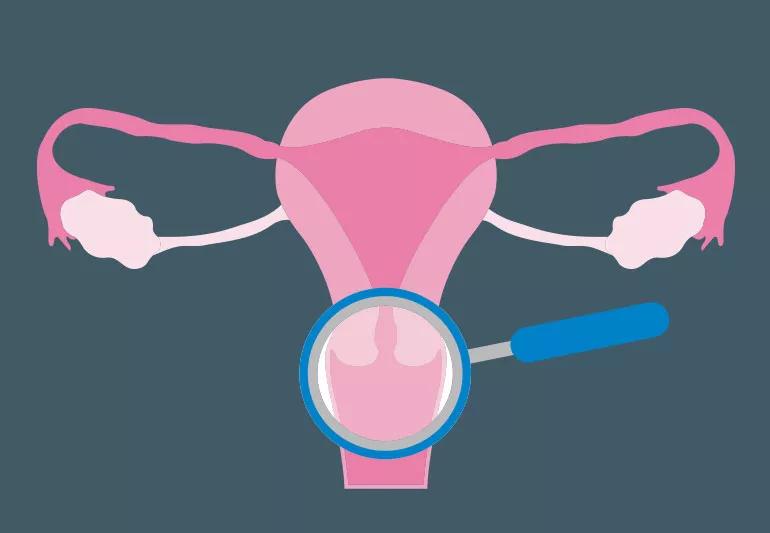Colposcopy, a commonly performed test detects cervix changes

If your Pap test comes back with an abnormal results, your first instinct may be to panic that you have cervical cancer. But, rest assured, your doctor will first want to do a careful evaluation ― usually including a colposcopy ― to determine whether there’s truly cause for concern.
Advertisement
Cleveland Clinic is a non-profit academic medical center. Advertising on our site helps support our mission. We do not endorse non-Cleveland Clinic products or services. Policy
“This complicated word really means a fairly simple procedure — examining the cervix in detail with a pair of high-tech binoculars,” says Ob/Gyn Pamela Hruby, MD. The whole thing usually takes no more than 10 to 15 minutes.
Here, Dr. Hruby explains what you can expect:
First, the doctor or nurse will talk to you about your Pap results, explain the procedure, and get your consent. They’ll want to know if you’re pregnant because it makes a difference in the procedures they do, Dr. Hruby says.
Next the doctor will put in a speculum, just like for a Pap test, and then bring the colposcope into place. The colposcope might look pretty intimidating, but it stays outside of you, so don’t worry.
A vinegar solution is applied to the cervix using large Q-tips. Most people don’t feel this part at all, but occasionally someone will feel mild stinging, Dr. Hruby says.
The vinegar will turn the abnormal areas of the cervix white. “This can take up to three minutes to take full effect, and it’s kind of boring until that happens,” Dr. Hruby says. “You just have to wait.”
Once the vinegar has done its work, the doctor will carefully look at each area of the cervix. A cervix looks like a donut from this angle. “There might need to be a little pushing and pulling using small Q-tips while we try to see as far as we can down the donut hole,” Dr. Hruby says.
Advertisement
If an area of whiteness is found, the doctor will use a small instrument to take a piece of the cervix for testing. This is known as a biopsy. There may be more than one area.
“Biopsies can pinch or pull, but they are over in a second. Most people don’t feel too much pain with them,” Dr. Hruby says. “The small pieces will be put into containers to send to the pathologist to evaluate.
“Sometimes the doctor will take a sampling from the inside of the cervix,” Dr. Hruby says. “This is done by touching inside the cervix and collecting some cells and mucus.” This is generally done with four swipes of a small, sharp instrument, or with a mascara-brush-type wand. This part can cramp, but it’s very important to make sure there are no abnormalities beyond where we can see, Dr. Hruby says. This part isn’t usually done if you’re pregnant.
If the biopsies stirred up any bleeding, pressure will be held over the areas. It may be necessary to use medication to stop the bleeding.
One method, silver nitrate, leaves dark ashes behind. These may fall out later into your underwear, looking like cigarette ashes, Dr. Hruby says. Another medication, Monsel’s solution, is a thick, amber-colored liquid that may also fall out later in dark chunks. Many women will wear a pad for a few days afterwards, just in case. Then the speculum is removed, and it’s all over!
“My advice to women is to find out how long it will be before the results are in, and call the office if you haven’t heard in a reasonable amount of time,” Dr. Hruby says. Your doctor will make a plan with you then, based on the biopsy results. If the results are consistent with low-grade changes or less, the plan will likely be to repeat the pap smear in one year.
One other thing to consider is the HPV vaccine. “You may think it’s too late to get it if you have already been infected with one kind of HPV,” Dr. Hruby says. “But since the vaccine now protects against nine strains of the HPV virus, consider talking to your healthcare provider about getting the vaccine.”
Advertisement
Learn more about our editorial process.
Advertisement

How to make sure you’re getting the most appropriate health care

Hint: You don’t need to panic

Yes, you can pee with a tampon in; no, they won’t stretch out your vagina or make cramps worse!

Estrogen loss contributes to bone loss, which significantly raises your risk of osteopenia and osteoporosis

The little blue pill might help with physical arousal, but there are better treatments for low libido in women

For large breasts, wearing a bra may provide support that helps alleviate back pain — but if you’re comfortable without one, go for it!

They have no proven benefits but can cause infection, damage your pelvic floor muscles and get stuck inside you

This chronic condition most commonly causes pelvic pain and severe cramping during periods, but it can bring other types of pain symptoms, too

Start having sex about 72 hours before ovulation, then at least every other day during your fertile window

Attachment theory suggests that your earliest relationships shape connections throughout your life

It isn’t a recognized mental health disorder, but research shows that problematic social media use can negatively affect your mental health, self-esteem and sleep